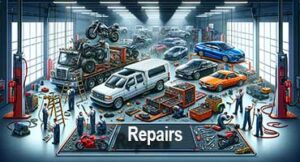Importance of Routine Vehicle Inspection: A Mechanic's Point of View, Houston Edition
2024.12.16
Automotive Repairs
As an auto mechanic in Houston, I see the aftermath of not having routine vehicle inspections. For some, these may be viewed as an added expense or an inconvenience; I can confidently say they are a necessity for the safety, performance, and longevity of a vehicle.
Picture yourself driving down the highway and your brakes fail. Or maybe, your engine overheats on a very hot summer day. While these situations are terrifying, they are totally avoidable with proactive vehicle maintenance. Regular inspections provide us, the mechanics, an opportunity to find problems before they become costly repairs or worse yet, accidents.

A complete vehicle inspection generally consists of detailed checks of several vital systems:
* Engine and Drivetrain: We check for leaks, listen for unusual noises, and evaluate the condition of belts, hoses, and fluids.
* Brakes: We inspect the brake pads, rotors, calipers, and lines to make sure they are functioning properly and safely.
* Suspension and Steering: We check components such as shocks, struts, and tie rods to ensure a smooth and safe ride.
* Electrical System: Always we inspect batteries, alternators, lights, and other electric accessories for malfunctioning.
* Emission System: A checkup in an emissions system is mainly about searching for leakages or blockages to avoid ecological disasters.
* Condition of Tires: The checking depth of tread, pressure, wear and tear of tires are involved herein.
* Improved Safety: We identify and resolve all potential problems in advance and hence minimize the chances of accidents due to failure in brakes, steering, and any other mechanical failure.
* Better Performance: By carrying out routine maintenance, the vehicle will run in the best manner with increased fuel efficiency and reduced emissions.
* Prolonged Life: Fixing minor problems before they become major will help extend the life of your car and save you money from future repairs.
* Savings: The regular inspections could actually save you money in the long term by preventing unexpected breakdowns and costly emergency repairs.
* Peace of Mind: The feeling your car has been thoroughly inspected and is in the right shape is invaluable as one gets on the road.
Who Should Perform Inspections?
While some drivers may do DIY inspections, professional mechanics are better equipped with the knowledge and special tools necessary for making such assessments.
When Should Inspections Occur?
• Manufacturer’s Recommendations: This can generally be found in a particular vehicle’s owner manual.
* Mileage: Generally, an inspection could be done every 30,000 miles or annually.
* Age of Vehicle: As the vehicle gets older, so does the requirement for inspections.
* Driving Conditions: In case one normally goes off-roading, drives on harsh conditions, or tows really heavy loads, then frequent inspections may be suggested.
Signs You May Need an Inspection Soon:
* Unusual Noises: Any unusual sounds coming from your engine, brakes, or suspension should be investigated as soon as possible.
* Check Engine Light: The check engine light turning on requires immediate diagnosis from a qualified mechanic.
* Poor Fuel Economy: A sudden decline in fuel economy may signify a mechanical problem.
* Problems with Steerability/Braking: Any anomaly related to the ability to steer or brake needs immediate attention.
* Visible Leaks: Oil, coolant, and power steering fluid leaks should, in particular, be located and eliminated.
In short, what has been discussed herein is: regular vehicle inspections are not an option but an obligation in responsible ownership of a vehicle. Besides safety, with regular care, one improves the car’s performance and prolongs the life of their car. Being an auto mechanic, I would highly recommend each driver to emphasize regular vehicle inspections and to find a qualified trustworthy mechanic to do the necessary job.
